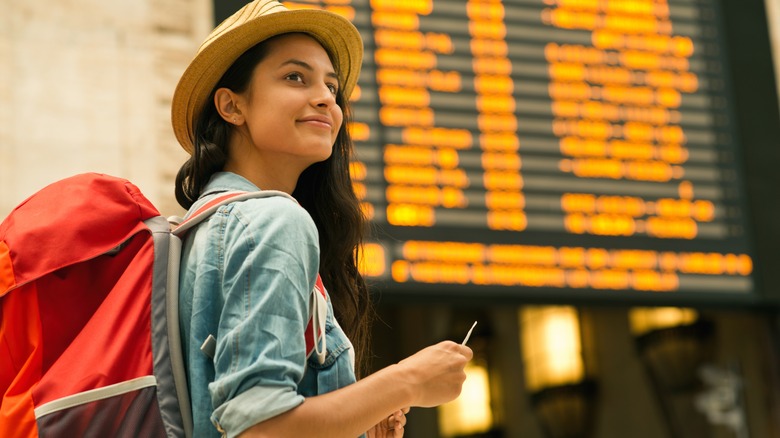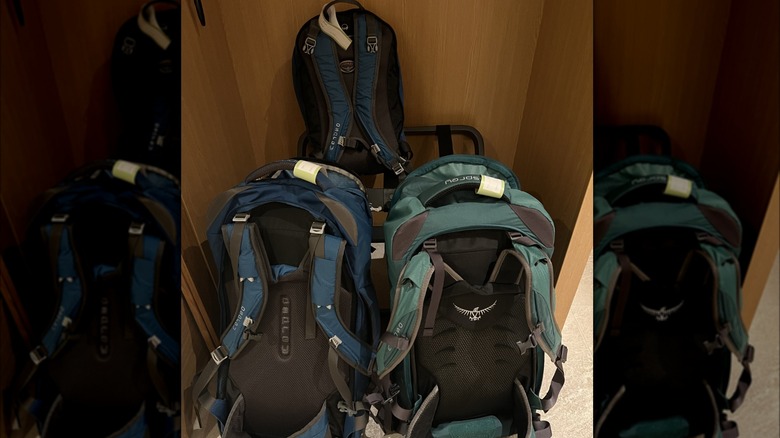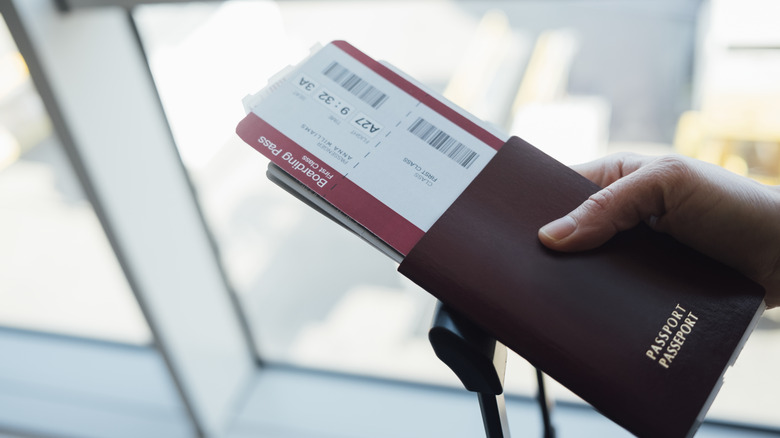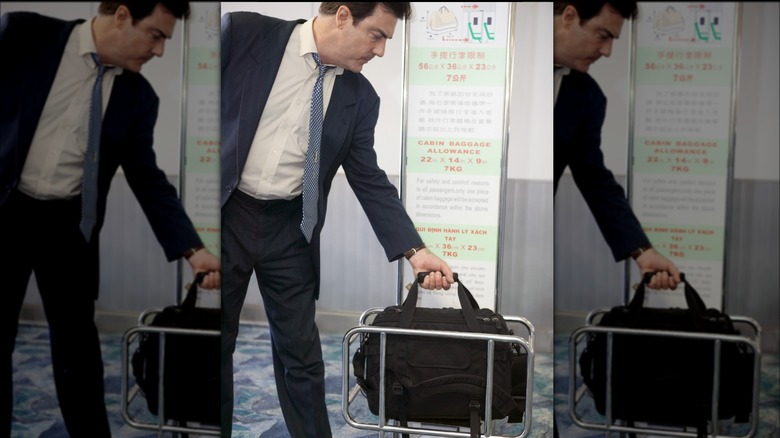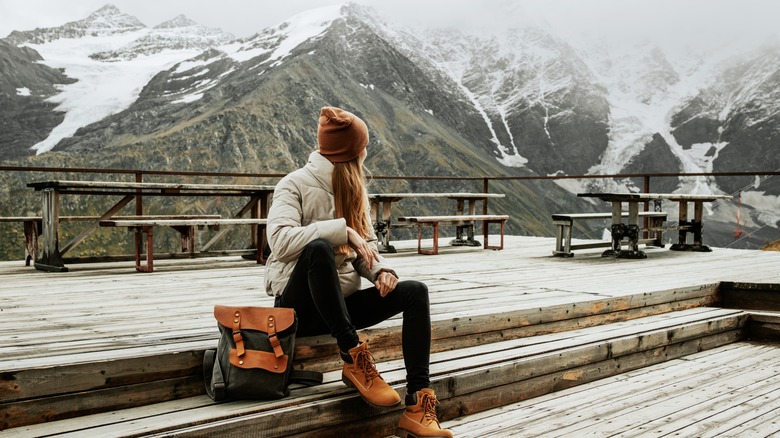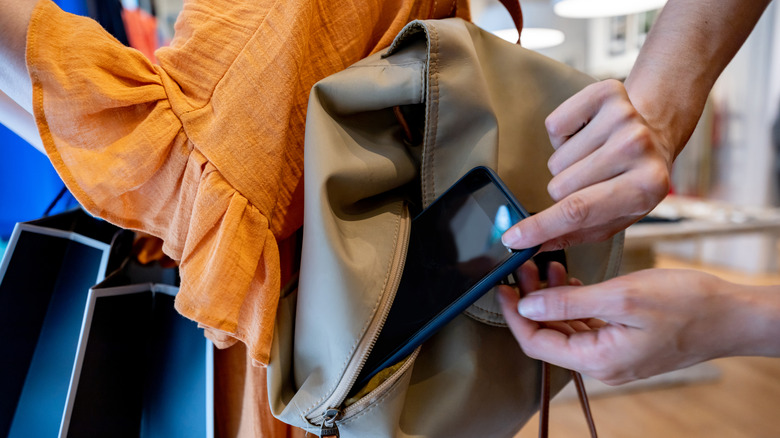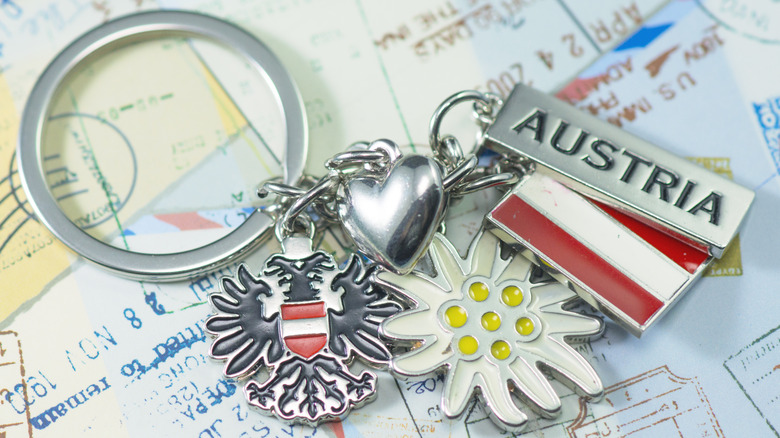10 Essential Tips For Backpacking Through Europe
Backpacking Europe is one of those dreamy scenarios many of us long for, even if the idea sounds intimidating. So long as you plan out the more logistical elements on a backpacking journey, though, it doesn't have to be as scary as it sounds. Backpacking is a freeing and fascinating way to see a place as varied and easily transited as Europe.
Traversing Europe with a big backpack is the best way to see several parts — popular and hidden gems combined — of the continent in one trip. That's largely because you won't have to pull or lug a roller bag across the cobblestone streets of Edinburgh or try to carry a giant checked bag up the stairs or hills of Rome. Once you eliminate the traveler's baggage, you open yourself up to a much simpler trip, especially if you plan on taking public transit or budget airlines along the way.
Keep your frame in mind when buying a backpack
The key to a good backpacking trip is the backpack itself. Osprey, for example, makes incredible packs for long-haul adventures with back supports, day packs that clip onto the larger bags, and lots of storage for everything you'll need. However, backpacks are made differently, and not every pack will be right for your body structure or stature. For example, if you have a petite frame or a short torso, smaller sizes might serve you better. Men with smaller frames have even found women's backpacking packs comfortable.
Backpacking bags also come in different volume sizes, so it's important to recognize how much you can feasibly carry on your back. These liter differentiations will also alert you to whether or not the bag will be accepted on certain airlines or train lines. When ordering a pack, you can also utilize size charts to help make the process easier. This is a vital planning piece for folks with wide hips or large chests. It might not matter to you if you can't use the chest clip for extra support, but if you want to use it, you must measure and order correctly.
Make your important documents accessible
One danger of backpacking is that your bag can become a black hole. The last thing you need is to lose your passport or visa papers in the vast expanse of your bag. A solid way to avoid this is to pack your bag with important documents tucked away in an easily accessible pocket or at the top of your pack. You could also keep them in your day pack, which is often easiest to wear on the front of your body so you can grab them quickly without taking off your backpack. It looks silly, but it takes some of the load off your back and balances you out.
A secondary safekeeping option includes having digital copies on your phone or stored through a secure cloud service. This doesn't replace needing your documents on your person while you travel, though it may serve in a pinch if you lose those and your backup hard copies.
Measure twice
When buying a traveling pack, make sure its dimensions are suitable for the airlines or other transportation options you plan on taking. That said, it's imperative to measure twice anyway — once when the pack is empty and again when it is filled. Just because it will fit in the bag checker for Ryanair when it's empty doesn't mean a fully stuffed bag will fit when you're trying to board. Save yourself some money and always measure twice.
If your bag exceeds the dimension limits, there are a few things you can do. You can either unload a few extraneous items or repack the bag. By rearranging and fitting items more tightly (rolled clothes are the way to go), you can change how your stuff sits in the bag. This can help morph the dimensions of the pack in a way that could make it fit the parameters of your transportation of choice.
Travel during the shoulder or off-season
Ordinarily, folks like to backpack Europe because getting around is easier, but they tend to do it also for budgetary reasons. Traveling during peak tourist season often presents better weather, which comes with increased prices. Backpacking in the dead of summer can also be much more challenging when sweat-drenched. While washing your clothes is a reasonable task when backpacking, it can be harder to properly de-stink your pack. If you're schlepping a giant bag through 100-degree weather in Greece, your backpack will smell terrible.
But journeying during the shoulder, mid-season, or off-season means saving money and not navigating overly crowded streets with a giant backpack. Besides avoiding crowds, touring during the off-season helps to prevent high humidity and sweltering days. And though backpacking Europe in summer is the rom-com trope, you'll generally be a lot more comfortable, even though it might be a bit rainy or colder.
Pack light
Here's the thing about backpacking Europe: it's not for overpackers. You need to pack light, minimally, and with intention, and your back will thank you. It's all about selecting versatile pieces — like a beach cover-up that could also be used as part of an outfit, and understanding that you can do laundry while you travel. This also serves as a terrific opportunity to practice your packing skills and explore travel-friendly products, like soap sheets instead of liquid body wash.
Another way to keep things light is to pack exactly what you need with your schedule in mind. So, perhaps, pack five pairs of underwear and wash them as you go or every four days. Give your clothes the same treatment, like two pairs of pants, a few shirts, and at least one or two top layers like a cardigan. You can also wear things that will otherwise weigh you down as you travel. For example, wearing your hiking shoes instead of carrying them will reduce your load by at least 2 to 3 pounds.
Choose the accommodations you want, not those that fit the norm
Just because the notion of backpacking often elicits thoughts of hostels doesn't mean you have to stay in one. If you prefer hotels, that's great, but if you'd rather mix various lodging types — micro hotels, hostels, homestays, and traditional hotels — go for it. You can even save money if you aren't staying in a 12-person dormitory-style hostel. Hostels aren't always the cheapest option anymore, especially if you are planning a trip at the last minute.
Plus, like bed and breakfasts, some hostels include a very extrovert-friendly environment, which you might not like. That can be avoided if you find a hostel with private rooms, but it's okay to look elsewhere if you want to spend time on your own or just with your travel companions. If the thought of walking into a luxury hotel with a massive backpack makes you feel out of place, think nothing of it. You don't need a Louis Vuitton trunk to stay somewhere nice; own your dedication to traveling light.
Always be aware
Unfortunately, your massive backpack will be a dead giveaway that you're a tourist no matter where you go. That makes you a prime target for thieves, and given the size of your pack, you may not notice if someone slices into it while walking by and takes something. That's why it's crucial to be aware of your surroundings and keep valuables in inaccessible spots. Even the best backpacking bags aren't necessarily knife-proof.
Since you can't see everything at all times, it's best to keep your most important items like money and passport in an interior pocket that will be harder for a thief to access. Alternatively, consider a pouch for your bag if you don't have appropriately sized built-in pockets for your valuables. You can also use RFID wallets to prevent digital theft of your credit or debit card numbers to further protect yourself. With these safeguards, you can backpack through Europe in peace.
Try to arrive at a new place in the daytime
Depending on your location in Europe, public transportation can sometimes have wonky hours; fortunately, it is easier to get around on foot during the daytime. So, strive to reach a new destination during the day, and you'll have time to orient yourself and get where you need to go more efficiently. Taking this advice also helps delay any riffraff that might crop up at night. That isn't to say that pickpockets and thieves don't operate during the day — daylight helps protect you from them; they tend to work more efficiently at night when there are fewer people and less light to give them away.
But since life always throws curveballs, be vigilant when you get somewhere after dark, particularly in the late night hours. While it might be pricier than taking public transportation, sometimes taking a cab or Uber to your hotel is enough to make you feel more secure in your new destination.
Plan for similar climates
Logistically, it's important to plan a backpacking trip that ideally involves similar outfit types. If the places you are visiting have identical temperatures and weather, you won't have to worry about packing lots of different clothing items. Yes, that means you'll have many photos of yourself wearing the same outfits in different places, but that's just one of the cons of backpacking.
Planning to visit countries with similar climates also makes the travel portion of your trip less complicated. If you aren't traversing the entire continent during your backpacking journey, you will save a lot of commuting time and the hassle of juggling wildly different microclimates. This planning step will be easier in the summer since the temperatures across the continent vary much less than during the colder months. That's especially true for places like Norway, Iceland, Finland, and other countries known for getting much colder.
Leave some room for souvenirs
Chances are, you'll want to buy something somewhere along the way. If you're on the go for weeks at a time, there's bound to be an item or two that catches your eye. So leave a little bit of room for a souvenir you'll find along the way. While you could always ship something home, it's expensive and could easily get lost.
One of the best ways to pack with a plan is to select items you'll use up along the way. From soap sheets for laundry and toothpaste tabs to snacks and travel-friendly products, these create a little more space in your pack as you go. If you want to really go for the ultimate space-making hack, you can also pack old socks and underwear that may need to be thrown out at some point on your trip. An odd tip, yes. But trust that it's a good standby.
